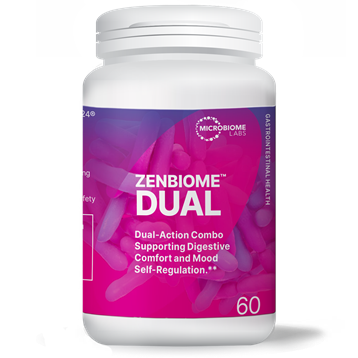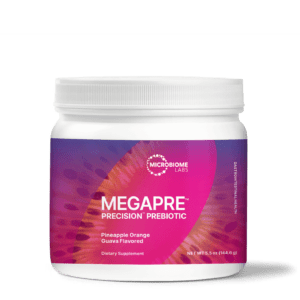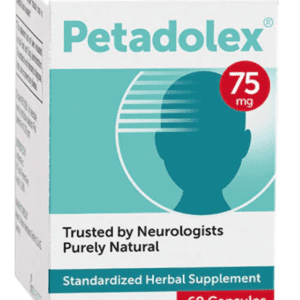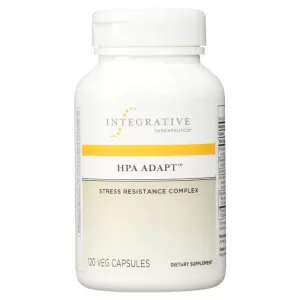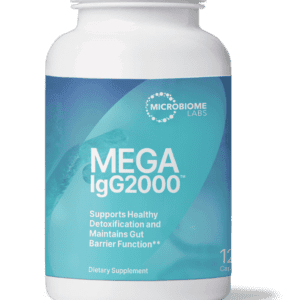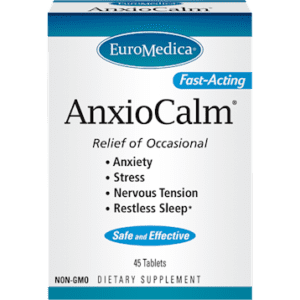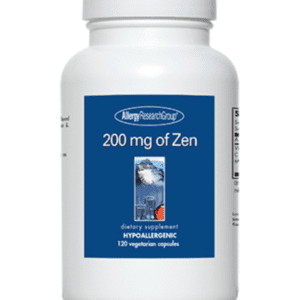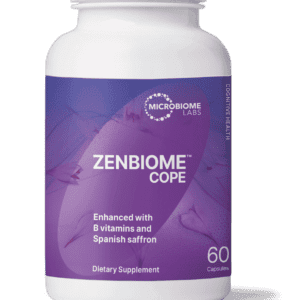Product Description
Zenbiome DUAL – Dual Action Probiotic Combo Supporting Digestive Comfort and Mood Self-Regulation
Psychobiotic/Probiotic Combination
Revolutionary Way to Support Healthy Gut-Brain Axis with Two Clinically Studied Unique Strains:
- Bifidobacterium longum — 1714™ a Psychobiotic for Mood
- Bifidobacterium longum 35624™ for Functional GI Disorders Like IBS
Zenbiome™ DUAL is a revolutionary dual-action probiotic combination is designed to address both functional GI disorders such as IBS and psychosocial comorbidities such as depression and anxiety.
Recent research has established a shared etiology for both disorders: a dysfunction in the gut-brain axis.
Powered by the innovative combination of Bifidobacterium longum 1714™ and Bifidobacterium longum 35624™, this unique formula targets the gut-brain axis, offering clinically demonstrated relief for IBS symptoms and associated psychological stress.
Bifidobacterium longum 1714™ is a trailblazing psychobiotic strain that supports cognitive function, mood regulation, sleep quality, and stress response and its biochemical expression within the body. This psychobiotic exerts its effect by targeting the HPA axis to support healthy cortisol levels.
Bifidobacterium longum 35624™ has 85 published studies showing efficacy in IBS symptoms, including a reduction in IBS Severity Symptom Scores across the board. This strain adheres to intestinal epithelial cells and the gut barrier’s mucous layer, supporting a calming effect and helping to maintain relief from abdominal discomfort, gas, bloating, constipation, and/or diarrhea. Supportive in all types of IBS — IBS-C, IBS-D and IBS-M.
The Gut-Brain Axis and Functional GI Disorders
The gut-brain axis is a bidirectional communication pathway between the gut microbiota and the central nervous system (via the vagus nerve). The signaling along this pathway is important for healthy digestion, GI comfort, cognitive function and mood.
When gut-brain axis is disturbed, the gut and brain no longer work together seamlessly. The digestive tract can become sensitive. Bowel muscle contractions may be altered. The GI system doesn’t function properly, hence the term Functional GI disorders. IBS is one example of a Functional GI disorder.
Symptoms of Functional GI disorders may include abdominal discomfort, gas, bloating, constipation, diarrhea or a combination of alternating constipation and diarrhea.
IBS, Psychosocial Disorders, Gut-Brain Axis Conditions
IBS has been linked to a dysfunctional microbiome, an altered immune response in the gut, sensitive to stress and comorbid anxiety and depression in the brain.
Gut dysbiosis disrupts tryptophan metabolism which can result in byproducts that are neuroinflammatory, contributing to mood disorders.
YouTube Video Explanation of Zenbiome DUAL, from Kiran Krishnan, Cofounder Microbiome Labs
Clinical Research: Bifidobacterium longum strains 1714® and 35642® Combination
A recently published study explores the impact of the probiotic combination in ZenBiome Dual: Bifidobacterium longum strains 1714® and 35642®
40 females (18-65y) with IBS & mild to moderate anxiety and/or depression supplemented with the probiotic combination (1 × 109 cfu/day) for 8 weeks. Outcome measures included: IBS Symptom severity (abdominal pain, abdominal pain frequency, abdominal distension severity, bowel habit satisfaction, quality of life), anxiety scores, depression scores, sleep quality, cortisol output and inflammatory biomarkers were taken weeks 0-16.
Key Findings:
- 82% of patients experienced a clinically significant improvement in IBS symptom severity
- Significant improvements were seen in depression scores, anxiety scores, sleep quality, and quality of life
- Normalization of the cortisol response was observed
- Improvements in inflammatory biomarkers (TNF-a, IL-6, and CRP) were correlated with beneficial effects on anxiety and depression
The Gut-Brain Axis and the Psychobiome
The gut-brain axis, a bidirectional communication between gut microbiota and the central nervous system (CNS), may play a role in cognitive function, digestion, and mood.
Studies show that 80-90% of the fibers in the vagus nerve are linked to the gut, providing a physical link through which the gut microbiota communicate with the brain.
Relatedly, the term psychobiome is used to describe the interaction between a person’s collective microbiome and their mental state.
A diverse and balanced microbiome can help maintain the gut-brain axis. A psychobiotic is used to describe the commensal bacteria that play a role in the gut-brain axis and support brain health.
About Psychobiotics and the Gut-Brain-Microbiota Axis
“The gut-brain-microbiota axis consists of a bilateral communication system that enables gut microbes to interact with the brain, and the latter with the gut. Gut bacteria influence behavior, and both depression and anxiety symptoms are directly associated with alterations in the microbiota.”
“The action mechanisms by which bacteria exert their psychobiotic potential has not been completely elucidated. However, it has been found that these bacteria provide their benefits mostly through the hypothalamic-pituitary-adrenal (HPA) axis, the immune response and inflammation, and through the production of neurohormones and neurotransmitters.
This review aims to explore the different approaches to evaluate the psychobiotic potential of several bacterial strains and fermented products.
The reviewed literature suggests that the consumption of psychobiotics could be considered as a viable option to both look after and restore mental health, without undesired secondary effects, and presenting a lower risk of allergies and less dependence compared to psychotropic drugs.”
— Excerpts from “Psychobiotics: Mechanisms of Action, Evaluation Methods and Effectiveness in Applications with Food Products,” Nutrients, 2020
From Microbiome Labs

